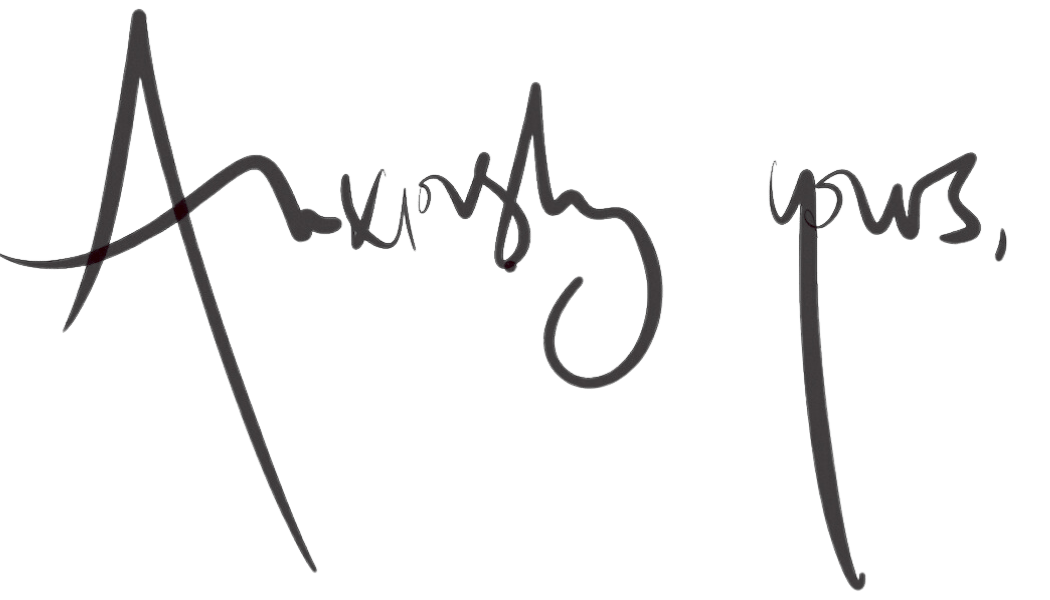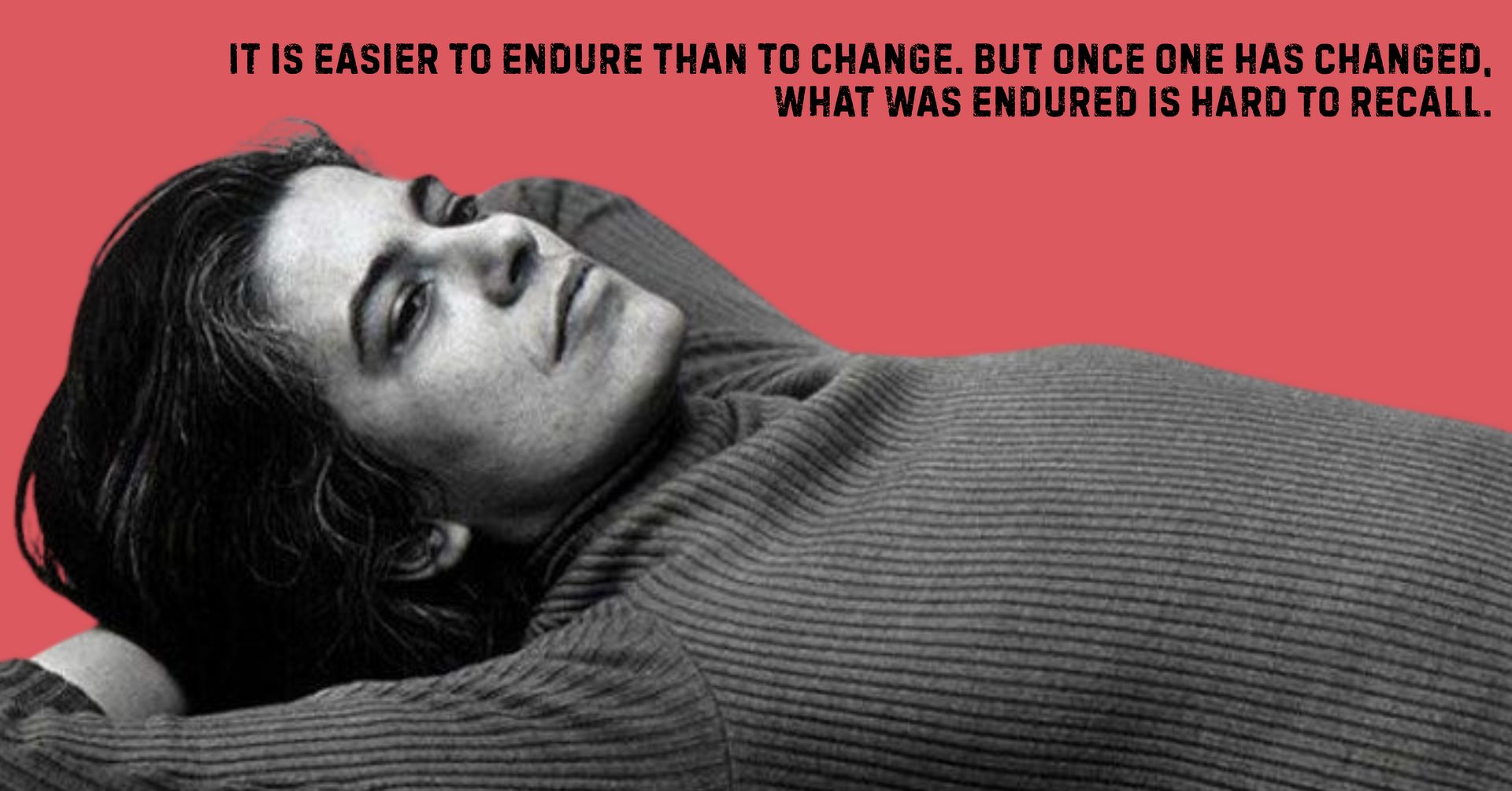Hello, friend. Welcome to The How to Live Newsletter—a weekly space for people who think deeply, feel fully, and want to grow without turning themselves into projects.
Here, psychology meets philosophy to offer grounded insight and emotional clarity, helping you make the hard parts of living a little easier—and reminding you that you’re not alone in trying to make sense of it all.
Susan Sontag on Experience as the True Language of Understanding
Interpretation, based on the highly dubious theory that a work of art is composed of items of content, violates art. It makes art into an article for use, for arrangement into a mental scheme of categories.
The project of my life has been overcoming all that holds me back, and all that holds me back is my mind.
So, the project of my life is overcoming my mind.
Why is the mind so often the place where we get trapped? Why are we consumed with categories and labels, instead of living in accordance with the fluid who-ness of ourselves?
One reason, I assume, is to avoid feeling the discomfort in not knowing anything for certain. And uncertainty, as we know, is uncomfortable. To escape it, we travel to an even crueler climate—our mind, where we interrogate every interaction to convince ourselves that our fears are valid.
We spend so much time dissecting our social, romantic, and workplace interactions—analyzing personal dynamics, professional failures, and disappointments—yet so little time directly engaging with the sensory and emotional experience of life itself. The result? We wind up repeating much of what we'd hoped to avoid. After all, it is far easier to intellectualize emotion than to feel it—but where does this lead?
In the seminal essay from her 1966 book Against Interpretation, writer, intellectual and cultural critic, Susan Sontag protests against the habit of critiquing and analyzing art in favor of developing a more emotional connection with art and literature.
What she shares shifted how I think about thinking, and flipped my sense of self on its head. Maybe, just maybe, this book helped me see, I’m not actually wrong at my core, after all?
Her critique of modern criticism is that it seeks to decode or explain art's "hidden" meanings. She believes this reduces the complexity of art to intellectual puzzles, thereby stifling its emotional and sensory impact. She urges readers to engage with art through feeling rather than analysis.
By interpretation, I mean here a conscious act of the mind which illustrates a certain code, certain “rules” of interpretation.
So much emphasis is placed on meaning, and the critic’s tendency to search for a singular, didactic interpretation of art often limits its impact. In my view, this emphasis perpetuates a misguided belief that there are ‘right’ and 'wrong' ways to experience and interpret a work of art—a belief that can be damaging and psychically debilitating for many artists.
At one time, art and culture were primarily experienced as emotional and sensory phenomena. Sontag would have probably palled around with Aristotle, for instance, since he saw art as therapeutically beneficial—he believed it could evoke and purge dangerous emotions. He gave us the concept of catharsis, believing that art revealed truths about the human condition and engaged audiences emotionally and intellectually.
Plato, however, saw art as a deception—a "mimesis" (an imitation of reality), not truth itself. He feared that art could mislead people by presenting a distorted view of the world and prioritized intellectual pursuits over sensory experiences.
Over time, the lens shifted, moving from sensory to intellectual experience. Art gradually became a vehicle for ideas, and artists began to be seen as thinkers, using their craft to express complex ideas and social critiques.
In the 18th and 19th centuries, formal art criticism emerged, transforming art from an experience to be felt into an object to be deciphered—meaning was extracted through analysis, not lived through the senses.
By the 20th century, the intellectualization of art swiped right on psychoanalysis, introducing a new view through which to analyze art—unconscious desires.
Sontag argued for a return to a more direct and sensory experience of art, lamenting that modern critics strip away the immediacy of art by imposing intellectual frameworks that obscure its aesthetic power. She called for an appreciation of art's sensory, emotional, and formal aspects—its form, structure, and editing—not just its intellectual or symbolic meaning.
For the first two decades of my life, my sensory experience was too acute. I felt things too hard, too loudly, too much, too intensely—and those sensations terrified me, sending me into anxious spirals and panic attacks. The emotions in my body were overwhelming, a constant reminder that not only the world but my very body was a terrifying place to inhabit.

Being in my head was a way to escape the terror inside my body. In my mind, I could at least create distance, as though being away from my body might save my life. I got trapped in the treehouse of my mind, trying to distance myself from the overwhelming sensations of panic and fear that my body held and that I was afraid to feel.
The overwhelming sensations that never scare me are those I feel in nature, listening to music, experiencing art, or reading. All forms and mediums of art move me. It's not my natural inclination to ask what a work of art "means," nor to dissect or analyze literature in search of some greater message. My body takes things in, and it's from there that I know the world.

When I write, it is with my body. My books are just feelings styled into sentences.
But this intuitive way of existing and creating art isn't valued in our culture, and my entire adult life has been a struggle to realize that I am expected to actually MAKE SENSE OF THINGS.
ME! A person who feels first and thinks second. A person who no one could make sense of for 25 years.
When my first novel, The Long Haul, came out, an interviewer asked me what the book was about. I felt stunned—how could I possibly say what all those feelings were "about"?
I've never thought it was an artist's job to interpret their work for an audience, but the world often doesn't agree with me, so—naturally—I've come to assume I'm wrong, despite holding onto a deep-seated belief that maybe I’m not?
So much of what has held me back in life is what Sontag is repudiating—over-intellectualizing. Although, in my case—as in many—what I'm over-analyzing is myself: my life, trying to decipher codes and meaning from the content of my actions, behavior, moods, and so on, instead of experiencing life and myself in the way I do naturally—through sensation.
This over-analysis, this constant quest for meaning, creates a barrier between me and the life I could be living. It's an internalized pressure to make sense of everything, to justify every decision, every feeling. The idea that everything must have a clear explanation, a rational framework, has kept me from simply being.
The modern style of interpretation excavates, and as it excavates, destroys; it digs “behind” the text, to find a sub-text which is the true one.
Just as Sontag criticizes the intellectualization of art, I find myself critiquing my existence in the same way—constantly turning inward, seeking reasons, patterns, and explanations rather than feeling my way through life.
It was only as I faced my panic disorder and learned to drop into my body when it felt most terrifying that I learned how to manage and shrink what bloomed there. It took years, but once I knew and understood my panic and anxiety, I could begin to live in my body without fear.
It's only when I write or make art that I am unafraid to feel my emotions because they have a place to go—into the work, rather than just sitting and growing larger with no exit inside me. For decades, my feelings tormented me because they were so disordered and felt catastrophic. But now that I know how to live inside my body, I trust my emotions and experiences more than my mind.
This is what art and life are meant to be: an experience, not an intellectual exercise. Focusing on sensory and emotional aspects means we return to a purer, more authentic form of connection with ourselves and the world around us.
What Sontag's essay offers is not just a critique of art criticism but a call to return to a more direct, visceral life experience. I read it as a relief, permission to exist in my natural state as a sensory-sifting human.

Susan Sontag alone on a bed. N.Y.C. 1965.” Photograph by Diane Arbus
In much the same way that we lose the full richness of art when we over-interpret it, we lose the fullness of life when we over-intellectualize our existence. The mind can be a powerful tool for understanding and reflection, but it should not be where we seek refuge from the world. It should be where we organize and understand, but never at the cost of the immediate, raw experience of living.
For me, the challenge is to stop living in my head, to stop seeking to understand everything, and to start living through sensation, through presence. It is an ongoing process, but one that promises freedom.
Freedom from the tyranny of interpretation, freedom from the fear of misunderstanding ourselves, freedom from the constant striving for meaning. By simply being, life provides the answers—not through analysis, but through experience.
For those constantly overanalyzing, interpreting, and questioning ourselves, this post offers an invitation to step out of the constant cycle of intellectualizing and embrace the immediacy of sensory experience.
Whether we're engaged in our work, relationships, or creative endeavors, there is value in turning down the volume of our overactive minds and allowing ourselves to feel and experience life as it is—raw, unfiltered, and present.
To interpret is to impoverish, to deplete the world—in order to set up a shadow world of “meanings.” It is to turn the world into this world.
The beauty of life is not always in its meaning, but in its capacity to be felt deeply and fully in the moments we simply let ourselves. The way forward is not to understand everything but to experience it, one sensation at a time.
Until next week, I will remain…

Amanda
Today in psychological history: October 29th, 1894
Harvard University refused to admit Mary Whiton Calkins to doctoral candidacy, despite Hugo Münsterberg's testimony that she was the best student he had ever had at Harvard University. Harvard's refusal was based on Calkins's gender.
P.S. Thank you for reading! This newsletter is my passion and livelihood; it thrives because of readers like you. If you've found solace, wisdom or insight here, please consider upgrading, and if you think a friend or family member could benefit, please feel free to share. Every bit helps, and I’m deeply grateful for your support. 💙
Quick note: Nope, I’m not a therapist—just someone who spent 25 years with undiagnosed panic disorder and 23 years in therapy. How to Live distills what I’ve learned through lived experience, therapy, and obsessive research—so you can skip the unnecessary suffering and better understand yourself.
Some links are affiliate links, meaning I earn a small commission at no extra cost to you. Every bit goes straight back into supporting this newsletter. Thank you!



 Upgrade
Upgrade